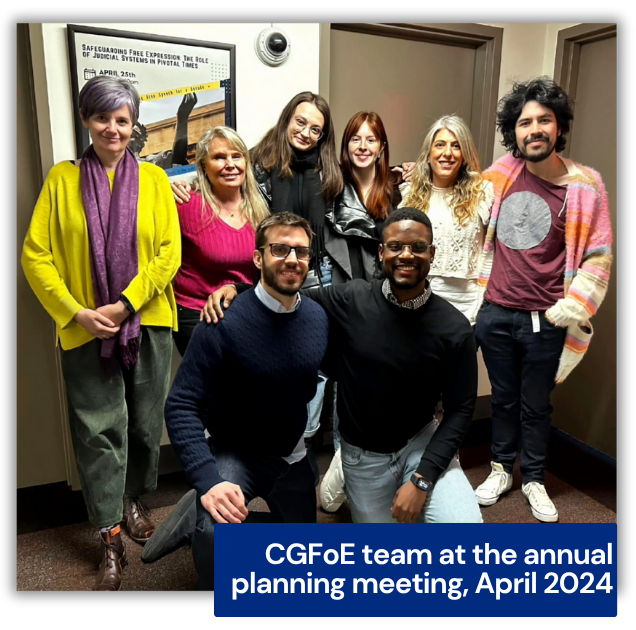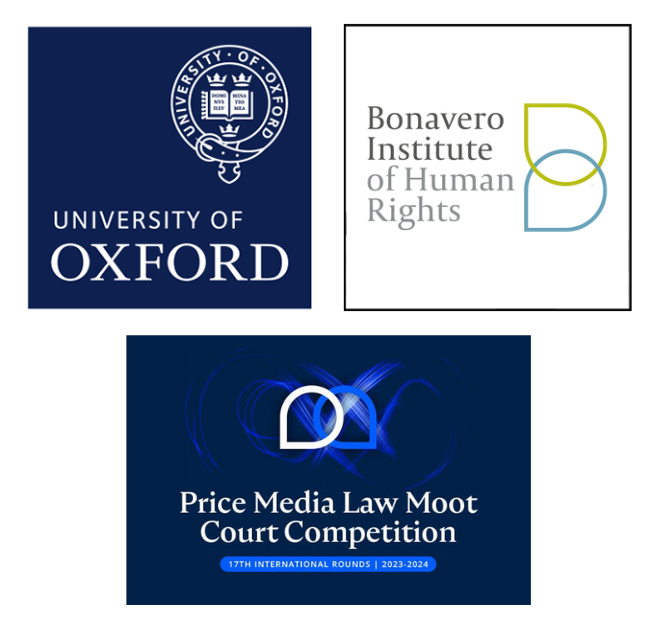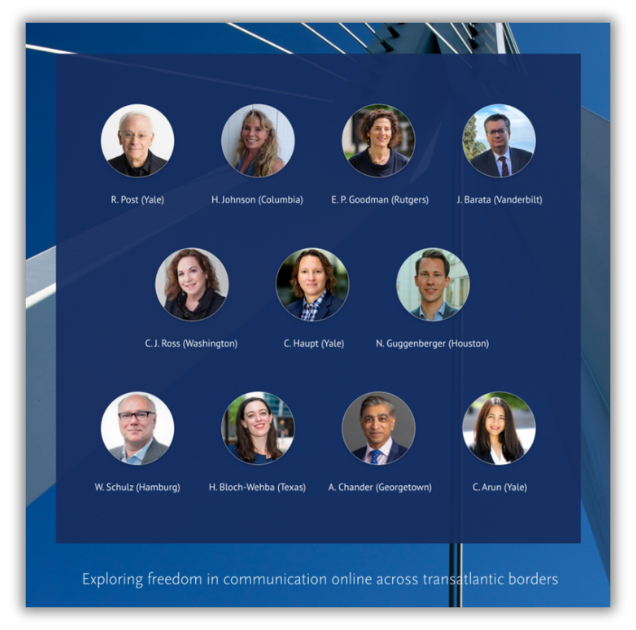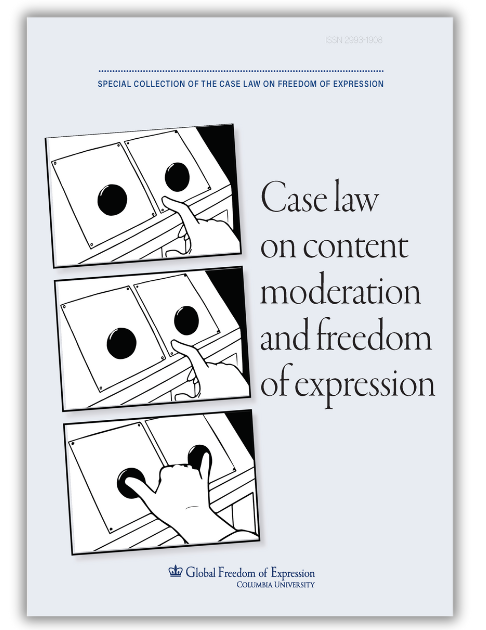“As threats to free expression evolve, we remain steadfast in our commitment to empowering legal professionals, scholars, and advocates with the knowledge and resources necessary to safeguard this fundamental right,” says Dr. Hawley Johnson, CGFoE Associate Director.
As Columbia Global Freedom of Expression (CGFoE) celebrates a decade of impact, 2024 has been a landmark year in our ongoing mission to defend and promote free expression worldwide. From hosting our 10th anniversary celebration to expanding our legal resources and strengthening global partnerships, CGFoE continues to be a driving force in shaping the legal landscape of free speech.

The celebration featured a keynote address by Aryeh Neier, President Emeritus of the Open Society Foundations, alongside thought-provoking panel discussions on “Breakthrough Verdicts: Legal Decisions Shaping the UN’s Sustainable Development Goals” and “Critical Legal Frontiers.” A special book talk, “Truth, Justice & the Power of Journalism”, showcased Elena Kostyuchenko, acclaimed Russian journalist and author, and Paul Caruana Galizia, author and son of the late Maltese journalist Daphne Caruana Galizia.
The event concluded on a powerful note with a musical performance by Vivir Quintana, the renowned Mexican singer and activist. Her song, El Corrido de Milo Vela, highlighted the violence faced by journalists in Mexico, calling for the protection of those who risk their lives to report the truth. Held at the historic Italian Academy, the celebration brought together dozens of global free speech advocates in person, while over a thousand attendees joined virtually to honor a decade of impact and progress.
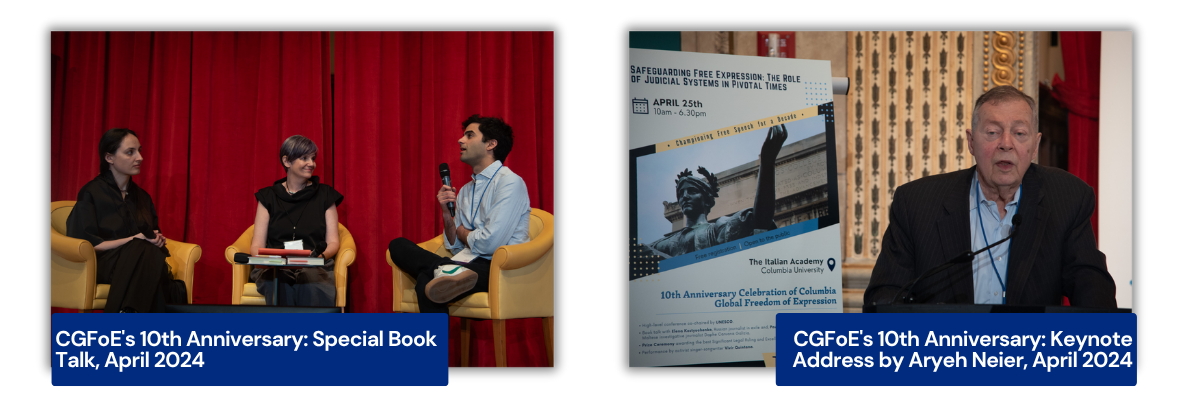

In the category of Significant Legal Ruling, the High Court of South Africa (Johannesburg) was recognized for its landmark decision in Mazetti Management Services (Pty) Ltd v AmaBhungane Centre for Investigative Journalism NPC. The ruling reaffirmed the critical role of investigative journalism in uncovering corruption and underscored the fundamental importance of source protection—an essential safeguard enabling journalists to pursue matters of public interest.
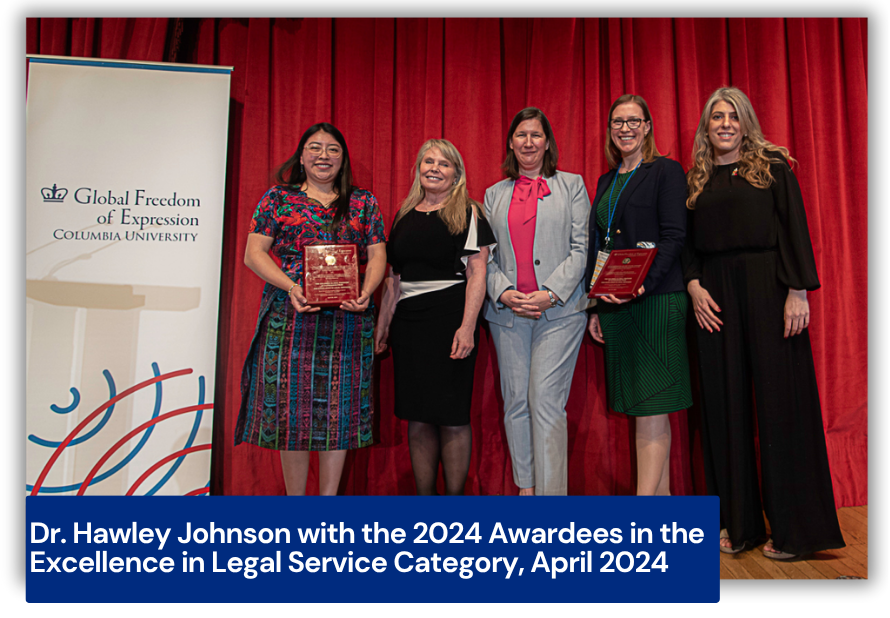 The Prize for Excellence in Legal Services was awarded to the Human Rights and Indigenous Peoples Clinic at Suffolk University Law School (Boston, USA) and the Association of Maya Lawyers and Notaries in Guatemala. Their years-long advocacy before the Inter-American Court of Human Rights in Maya Kaqchikel Indigenous Peoples of Sumpango et al. v. Guatemala led to a landmark decision addressing discriminatory regulations on radio frequency allocations in Guatemala—ensuring greater access to communication rights for Indigenous communities.
The Prize for Excellence in Legal Services was awarded to the Human Rights and Indigenous Peoples Clinic at Suffolk University Law School (Boston, USA) and the Association of Maya Lawyers and Notaries in Guatemala. Their years-long advocacy before the Inter-American Court of Human Rights in Maya Kaqchikel Indigenous Peoples of Sumpango et al. v. Guatemala led to a landmark decision addressing discriminatory regulations on radio frequency allocations in Guatemala—ensuring greater access to communication rights for Indigenous communities.

Database Growth
CGFoE continues to be a leading hub for legal professionals worldwide, fostering dialogue and advancing the protection of free expression. In 2024, the Global Case Law Database expanded significantly, with 150 new case analyses added, bringing the total to over 2,400 cases from more than 130 countries.
The database’s influence is undeniable—between January and December 2024, it recorded over 5 million user interactions, reinforcing its value as a trusted resource for legal experts, scholars, and advocates worldwide.
Its impact was further highlighted when ARTICLE 19 and the Justice Clinic at the University of California, Irvine School of Law submitted an Amicus Brief before the U.S. Supreme Court in Moody v. NetChoice, citing CGFoE’s analysis of Scanlen & Holderness v. Zimbabwe—a testament to the database’s authority as a resource in high-stakes legal debates.
Linguistic Expansion
In April 2024, CGFoE broadened its global reach with the launch of a French-language database, alongside a complete redesign of its Arabic and Spanish homepages. Additionally, limited versions of the database are available in Russian and Portuguese, further enhancing accessibility for diverse audiences.
This multilingual approach has significantly increased engagement. Over the past year alone, CGFoE welcomed more than 460,000 users, averaging 1,500 – 2,000 on work days, with strong readership in India, the United States, the United Kingdom, the Philippines, Canada, Nigeria, South Africa, the Netherlands, Malaysia, Australia, and Argentina.
Through these expansions, CGFoE continues to strengthen its role as a vital resource for defending and advancing freedom of expression worldwide.
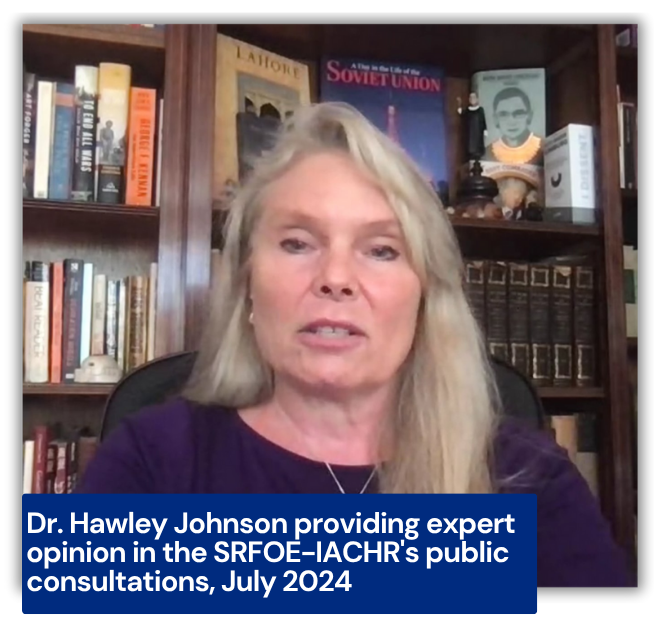 We contributed to the upcoming report on freedom of expression and unprotected speech by the Office of the Special Rapporteur for Freedom of Expression (SRFOE) of the Inter-American Commission on Human Rights (IACHR), submitting written observations on key jurisprudential approaches to hate speech.
We contributed to the upcoming report on freedom of expression and unprotected speech by the Office of the Special Rapporteur for Freedom of Expression (SRFOE) of the Inter-American Commission on Human Rights (IACHR), submitting written observations on key jurisprudential approaches to hate speech.
This was followed by Dr. Hawley Johnson’s participation in a public consultation, where she emphasized that the IACHR should urge States to foster a better environment for free expression and prevent the proliferation of hate speech regulations.
A significant new partnership is underway with the Observatoire de la liberté d’expression at Université du Québec à Chicoutimi (Canada). This collaboration will see the Observatoire curate CGFoE’s French-language database and spearhead the development of our francophone network, enhancing accessibility for French-speaking legal communities worldwide.
Our network continues to grow, with expanded cooperation among law professors in Hungary, Poland, South Africa, and Canada, as well as judges in Brazil and at the African Court on Human and Peoples’ Rights.
The CGFoE team represents a global community, with staff hailing from five continents and nine countries—Argentina, Colombia, the Dominican Republic, India, Serbia, Russia, Egypt, South Africa, and the United States. Our diverse expertise spans freedom of expression, international law, human rights advocacy, and journalism defense. In addition, our contributing legal researchers bring expertise from a diverse array of countries, including Namibia, Rwanda, Nigeria, Malaysia, the Netherlands, Turkey, Lebanon, Brazil, Bulgaria, Hungary, Poland, North Macedonia, Bosnia, Cyprus, Tunisia, Italy, and the United Kingdom, among others.
Our impact continues to grow, with nearly 2,000 subscribers across our combined newsletter lists. Much of the content we feature —scholarly publications, legal announcements, and reports— comes directly from our partners, who see CGFoE as a vital platform for engaging the global freedom of expression community.
Through these partnerships and collaborations, CGFoE remains at the forefront of legal advocacy, knowledge-sharing, and global dialogue on free expression.

For over a decade, UNESCO has been a key partner and donor, playing a crucial role in the thematic and linguistic expansion of CGFoE’s Global Case Law Database and legal research tools.
In April 2024, CGFoE successfully concluded a series of initiatives carried out within the framework of its UNESCO-funded grant, which included:
- World Press Freedom Day 2023– Organizing a side event to showcase the database and related legal research tools.
- Expanding Multilingual Access – Translating 20 case analyses on influential and precedent-setting court rulings into French.
- International Outreach – Hosting a series of 20 webinars to introduce the database to legal communities worldwide.
- Strengthening Election Law & Free Expression – Producing 10 case analyses on landmark court decisions related to elections and freedom of expression, with translations in French, Portuguese, and Spanish.
- Organizing a high-level conference dedicated to examining legal decisions shaping the UN’s Sustainable Development Goals and global challenges to freedom of expression.
- Broadening Scholarly Resources – Translating five Special Collection Papers into French and Portuguese.
In January 2025, UNESCO supported a new initiative: a series of six interactive webinars for justice actors to promote UNESCO’s report, “The Misuse of Financial Laws to Pressure, Silence and Intimidate Journalists and Media Outlets,” along with IAPA/WAN-IFRA’s report on “The Misuse of Economic Charges to Silence, Threaten and Attack the Press.” These regionally focused webinars aimed to examine how censorship manifests in different jurisdictions and promote cooperative strategies to counter its chilling effects on freedom of expression. At the moment, the project is on hold due to recent U.S. Executive Orders.

CGFoE, with UNESCO’s support, hosted more than 20 webinars in 2023-2024, fostering critical discussions on emerging challenges to freedom of expression worldwide. Following are a few highlights.
Judicial Training: The Internet and Freedom of Expression
In collaboration with Judge Fernando Biolcati and the São Paulo School of Judges, CGFoE organized a seven-part webinar seriesas part of an official Judicial Training Program on “The Internet and Freedom of Expression.” Held weekly, the course explored academic and judicial trends in online communication, particularly as they relate to free expression in Brazil and beyond. Five of the webinars were based on CGFoE’s Special Collection papers, featuring presentations by an author, editor, or expert, alongside a Brazilian legal scholar, with discussions moderated by a Brazilian judge.
Sessions were held in Portuguese with simultaneous English interpretation for guest speakers.
The Power of Song—Repercussions for Free Speech in Hong Kong
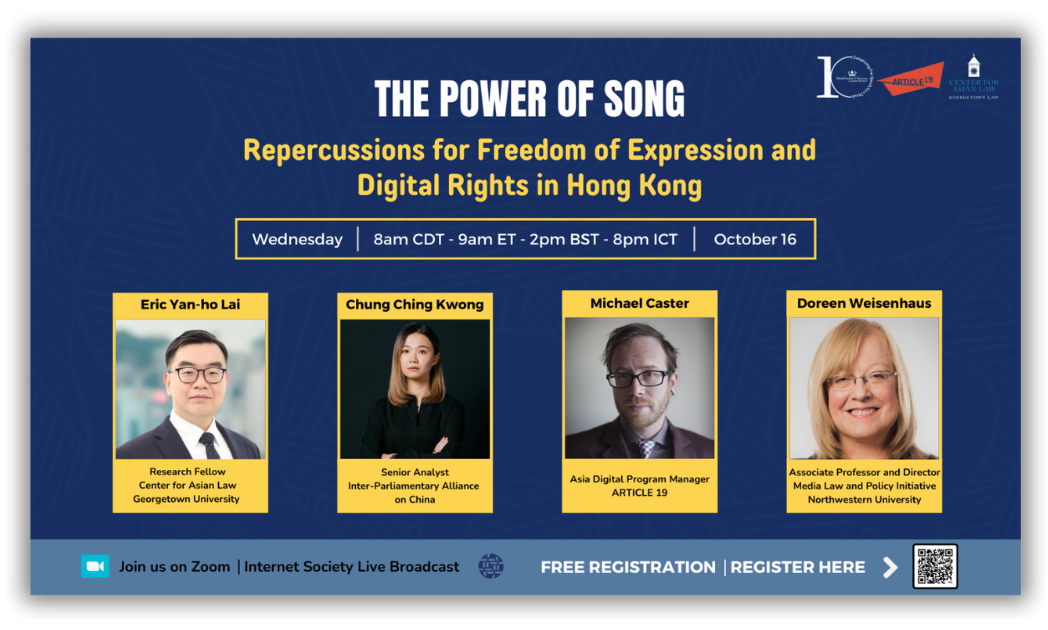 This webinar, featuring Michael Caster (ARTICLE 19), Chung Ching Kwong (Hong Kong digital rights activist), Dr. Eric Yan-ho Lai (Georgetown Center for Asian Law), and Doreen Weisenhaus (Northwestern University), examined the impact of the banning of a popular protest anthem, “Glory to Hong Kong, on the judiciary and the implementation of the national security law in Hong Kong.
This webinar, featuring Michael Caster (ARTICLE 19), Chung Ching Kwong (Hong Kong digital rights activist), Dr. Eric Yan-ho Lai (Georgetown Center for Asian Law), and Doreen Weisenhaus (Northwestern University), examined the impact of the banning of a popular protest anthem, “Glory to Hong Kong, on the judiciary and the implementation of the national security law in Hong Kong.
To date, it has been seen over 9,000 times and viewed more than 1,500 times across platforms.
French-Language Webinars: Launching the French Database
To mark the launch of CGFoE’s French-language database, the following webinars were conducted in French with simultaneous English interpretation:
- Internet Shutdowns in International Law – Featuring Joan Barata (Justitia & Stanford Cyber Policy Center), Felicia Anthonio (Access Now), and Aisha Dabo (AfricTivistes).
- Global Trends in the Right to Be Forgotten – With Ramiro Alvarez Ugarte (CELE, Argentina), Frédéric Gras (Paris Bar), Anderson Javiel Dirocie De León (CGFoE), and Basile Ader (former Paris Bar President).
- Hate Speech: The Enduring Problem of Thresholds– Featuring Natalie Alkiviadou (Vanderbilt University), Bernard Chevalier (French Court of Cassation), Anderson Javiel Dirocie De León (CGFoE), and François Jauny (researcher).
- Freedom of Expression in the African System – With Anderson Javiel Dirocie De León (CGFoE), Sarah Peeters (Pan African Lawyers Union), Sylla Sow and Alfred Nkuru Bulakali (ARTICLE 19, Senegal & West Africa).
Through these initiatives, CGFoE continues to facilitate discussions on critical free expression issues, reaching diverse legal communities worldwide.
Oxford University – Price Media Law Moot Court Competition
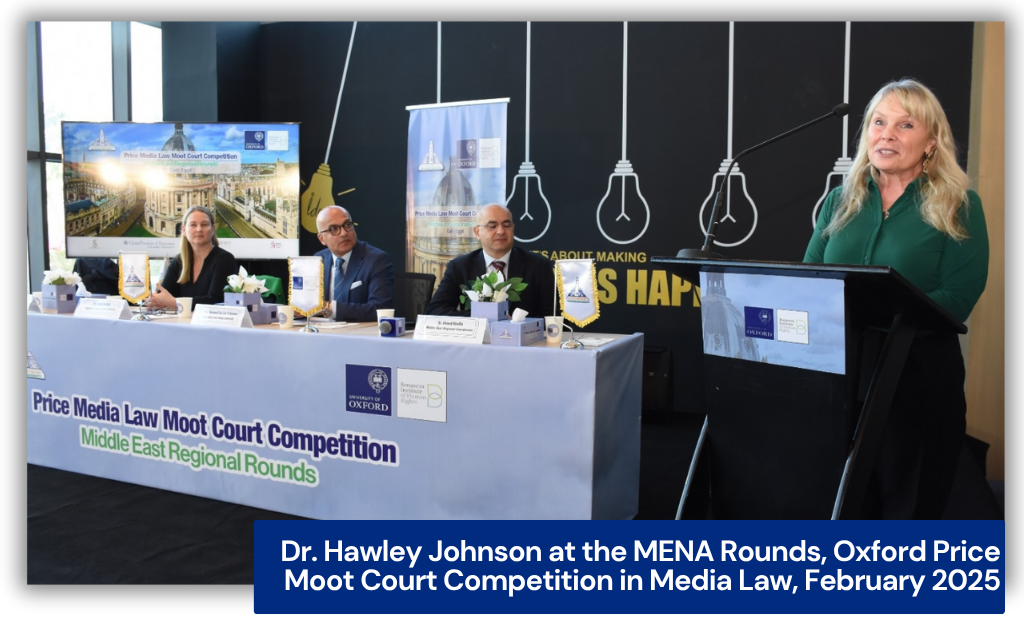 For over a decade, CGFoE has collaborated with the Price Media Law Moot Court Competition at the Bonavero Institute of Human Rights, University of Oxford, where Dr. Hawley Johnson frequently serves as a judge in regional and international rounds.
For over a decade, CGFoE has collaborated with the Price Media Law Moot Court Competition at the Bonavero Institute of Human Rights, University of Oxford, where Dr. Hawley Johnson frequently serves as a judge in regional and international rounds.
In February 2025, Dr. Johnson played a prominent role at the MENA Rounds in Cairo, Egypt, delivering opening remarks, speaking on a panel discussion, and serving as a finals rounds judge. In April 2025, Dr. Johnson was part of the star selection of judges, presiding over the International Rounds at University of Oxford, where she also held a joint session on Protecting Freedom of Expression through Comparative Case Law with Lautaro Furfaro, CGFoE’s Senior Legal Researcher.
This continued involvement reflects CGFoE’s deep commitment to fostering the next generation of free expression advocates. Many former mooters have gone on to join CGFoE as legal researchers, while others serve as Moot Court coaches—actively promoting and incorporating the Global Case Law Database into legal training and advocacy. In the past two years, CGFoE has deepened its engagement through a partnership with Professor Ahmed Khalifa of Ain Shams Law School, Cairo, Egypt, who also serves as the Middle East Coordinator for the Oxford Price Media Moot Court Competition.
Together, we have conducted two five-week online seminars, “Freedom of Expression in the Digital Realm: New Actors and Novel Challenges,” designed to equip Moot Court alumni and law students with expertise in international human rights law, comparative law, and legal writing techniques. Participants have come from Egypt, Palestine, Libya, Jordan, Lebanon, and Tunisia, with a third seminar scheduled for June–July 2025.
Toolkit: What’s in a Joke? Assessing Humor in Free Speech Jurisprudence
CGFoE partnered with Forum for Humor and the Law (ForHum) to develop a judicial toolkit on the protection of humor and satire as essential forms of democratic expression. The toolkit provides legal guidance on assessing humorous speech, drawing from human rights law, intellectual property law, and humor scholarship. On October 24, 2024, CGFoE hosted an expert review meeting with ForHum’s Advisory Board, followed by a public panel discussion on October 25 featuring two authors and a roundtable discussion with esteemed legal experts, including Lady Justice Stella Isibhakhomen Anukam (African Court on Human and Peoples’ Rights); JUDr. Barbora Bukovská (ARTICLE 19); Mehdi Benchelah (UNESCO); Judge Darian Pavli (European Court of Human Rights). Funded by the Dutch Research Council, the toolkit will officially launch in Spring 2025.
CYRILLA Collaborative
Since 2019, CGFoE has been part of the CYRILLA Collaborative, a global initiative managing an open-access legal database on digital rights. The Collaborative includes five key partners: CIPIT (Kenya); SMEX (Lebanon); APC (Asia); Derechos Digitales (DD) (Chile); and CGFoE (U.S.). With support from the U.S. Department of State, Bureau of Democracy, Human Rights, and Labor, CGFoE worked on expanding the database in French and Arabic and published 70 new case analyses on digital rights.
CGFoE continues to advance legal scholarship on freedom of expression by collaborating with leading universities, research institutes, and international organizations to produce cutting-edge analysis, host high-level discussions, and contribute to global legal debates.
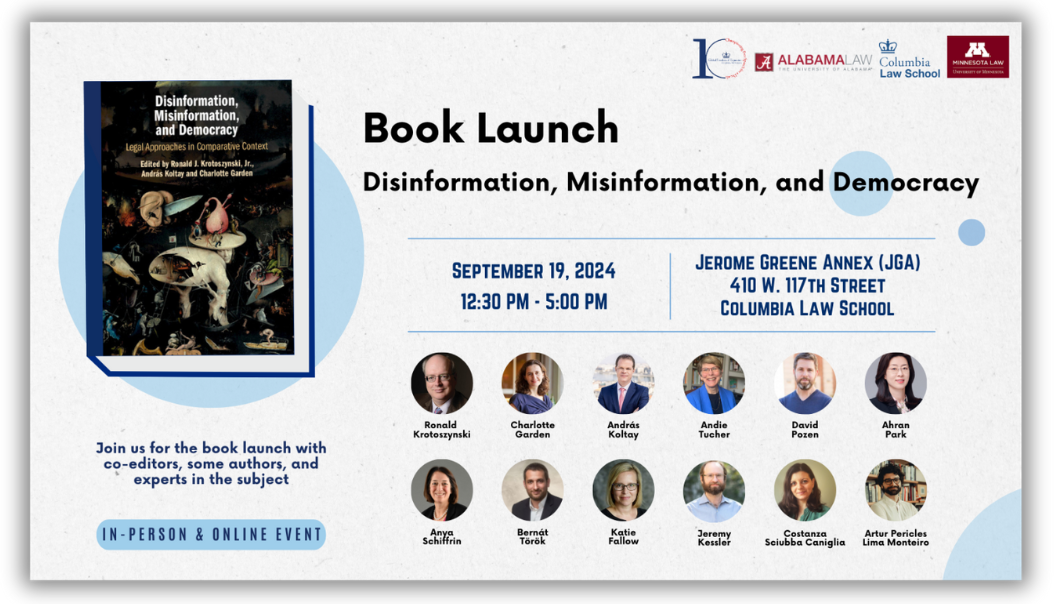 In collaboration with law schools at the University of Alabama, the University of Minnesota, and Columbia University, CGFoE co-hosted a book launch and panel discussion for the edited volume Disinformation, Misinformation, and Democracy: Legal Approaches in Comparative Context, exploring the intersection of information integrity and democratic governance.
In collaboration with law schools at the University of Alabama, the University of Minnesota, and Columbia University, CGFoE co-hosted a book launch and panel discussion for the edited volume Disinformation, Misinformation, and Democracy: Legal Approaches in Comparative Context, exploring the intersection of information integrity and democratic governance.
CGFoE continues to support the work of the UN Special Rapporteur on Freedom of Opinion and Expression, Irene Khan. Following a meeting in October 2024, we submitted a summary of case law from our database on elections and technology, contributing to her forthcoming report.
Our SLAPPs Special Collection Paper was cited in the UN Office of the High Commissioner for Human Rights (OHCHR) report on The Impact of SLAPPs on Human Rights & How to Respond.
We also published the second edition of our Special Collection paper, Case Law on Content Moderation and Freedom of Expression, expanding on key legal precedents shaping digital governance.
CGFoE is contributing a chapter to the upcoming volume Chilling Effect and Freedom of Expression – “Frozen” Speech in Transdisciplinary Perspectives, edited by Dr. Gergely Gosztonyi and Dr. Gergely Ferenc Lendvai. Titled “A Comparative Analysis of the Case Law from the African, European, and Inter-American Human Rights Systems,” it examines key rulings from regional human rights courts, including the ECtHR, IACtHR, and the African Court and Commission, and select cases from ECOWAS and the East African Court of Justice. The chapter explores chilling effect case law, highlighting regional convergences and disparities in protecting free expression. The book will be published by Springer International in Fall/Winter 2025.
- Two Special Collection papers examining:
- How courts address online gender-based violence.
- Analysis of UN Human Rights Committee case law.
- Freedom of Expression Seminars: University of Buenos Aires, Ain Shams Law School.
- 2026 Global Freedom of Expression Prizes.



